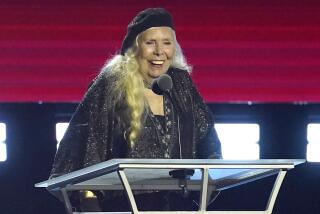MUSIC REVIEW : KIRI TE KANAWA IN BOWL DEBUT
- Share via
Though she has appeared in recital at Ambassador Auditorium three times in the last six years, Dame Kiri Te Kanawa arrived at Hollywood Bowl for the first time Wednesday night. For her Bowl debut, the soprano from New Zealand gave a standard recital program which alternated music she has previously sung here with fresh repertory.
Musically cool, gorgeous to look at and detached in relation to the texts she sang, Te Kanawa, assisted handsomely by Martin Katz at the piano, produced beautiful sounds in almost every moment but failed to involve her listeners in an interpretive way.
Wearing a lavish black and gold cape over a Chinese-red gown, she began her program with arias from operas of Handel--”Atalanta,” “Agrippina” and “Rinaldo”--without making much distinction between them, or the emotions they describe.
Here, as later in this evening, the statuesque singer seemed to make pretty tones for their own sake, without reference to words, dramatic context or niceties of style. Indeed, she applied, across the stylistic board, both downward scooping and generic phrasing, i.e., a pragmatic approach to breathing.
To music of Mozart (the aria, “Bella mia fiamma,” K. 528) and Richard Strauss (five songs) Te Kanawa brought similar, partially realized, yet always nicely vocalized, interpretations. Watching and hearing her can be extremely pleasing, until one realizes that, in terms of intellect and dramatic involvement, she may not really be present.
The most beautiful singing of the event took place in the group of songs by Henri Duparc--”Chanson triste,” “Extase,” “La vie anterieure” and “Phidyle”--items that depend on musical atmosphere more strongly than on textual values.
Similarly, the soprano charmed her friendly audience (counted by Bowl management at 5,349) with handsome singing of two excerpts from Canteloube’s arrangements of “Songs of the Auvergne.”
At the end, Te Kanawa/Katz offered four Irish folk songs as overarranged by Gamley: “Danny Boy,” “The Keelrow,” “Can Ye Sew Cushions?” and “Come to the Fair” with the same kinds of game and generalized readings which had come before.
Three encores followed: Doretta’s Dream, from Puccini’s “La Rondine”; “Summertime” from Gershwin’s “Porgy and Bess” and another Puccini aria, “O mio babbino caro,” from “Gianni Schicchi.”
More to Read
The biggest entertainment stories
Get our big stories about Hollywood, film, television, music, arts, culture and more right in your inbox as soon as they publish.
You may occasionally receive promotional content from the Los Angeles Times.










